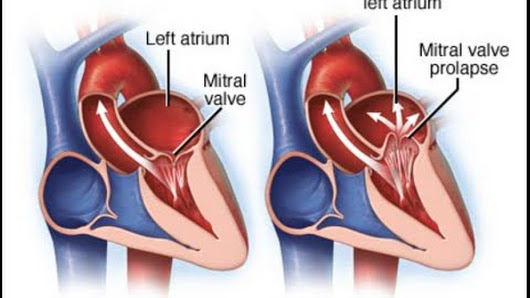Mitral valve regurgitation — also called mitral regurgitation, mitral insufficiency or mitral incompetence — is a condition in which your heart’s mitral valve doesn’t close tightly, allowing blood to flow backward in your heart. If the mitral valve regurgitation is significant, blood can’t move through your heart or to the rest of your body as efficiently, making you feel tired or out of breath.
Treatment of mitral valve regurgitation depends on how severe your condition is, whether it’s getting worse and whether you have symptoms. For mild leakage, treatment is usually not necessary.
Mitral Valve Regurgitation Symptoms
-
Some people with mitral valve disease might not experience symptoms for many years. Signs and symptoms of mitral valve regurgitation, which depend on its severity and how quickly the condition develops, can include:
- Abnormal heart sound (heart murmur) heard through a stethoscope
- Shortness of breath (dyspnea), especially when you have been very active or when you lie down
- Fatigue
- Heart palpitations — sensations of a rapid, fluttering heartbeat
- Swollen feet or ankles.
Mitral Valve Regurgitation Causes
There are four valves in your heart that keep the blood flowing in the right direction. These valves include mitral valves, tricuspid valves, pulmonary valves, and aortic valves. Each valve has flaps (leaflets or cusps) that open and closes once during each heartbeat. Sometimes, the valve does not open or close properly, causing blood flow to your heart in your body. In mitral valve regurgitation, the upper left heart chamber (left atrium) and the lower left heart chamber (left ventricle). The middle valve does not close tightly, causing blood to leak into the posterior left atrium (regurgitation).
Mitral Valve Regurgitation Treatment
Mitral valve regurgitation treatment depends on how severe your condition is, if you are experiencing signs and symptoms and if your condition is worsening. The goal of treatment is to improve your heart function while reducing your signs and symptoms and avoiding future complications. A doctor trained in heart disease (cardiologist) will provide care to you. If you have mitral valve regulation, consider being treated in a medical center with a multi-disciplinary team of doctors and medical staff trained and experienced in the evaluation and treatment of heart valve disease. This team can work closely with you to determine the most appropriate treatment for your condition.
Watchful Waiting
Some people, especially those with mild regurgitation, might not need treatment. However, the condition may require monitoring by your doctor. You may need regular evaluations, with the frequency depending on the severity of your condition. Your doctor may also recommend making healthy lifestyle changes.
Medications
Medications may include:
Diuretics: These medications can relieve fluid accumulation in your lungs or legs, which can accompany mitral valve regurgitation.
Blood thinners: These medications can help prevent blood clots and may be used if you have atrial fibrillation.
High blood pressure medications: High blood pressure makes mitral valve regurgitation worse, so if you have high blood pressure, your doctor may prescribe medication to help lower it.
